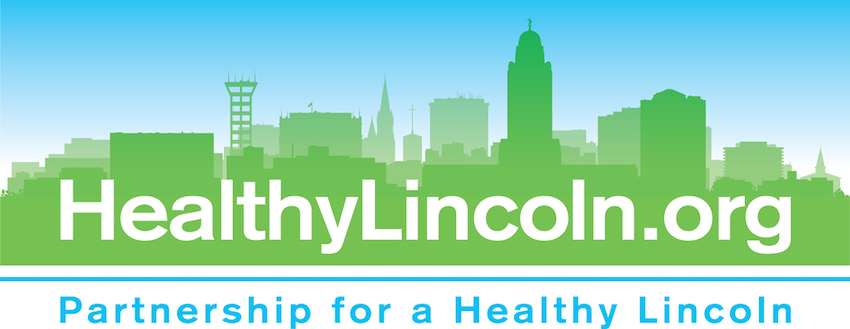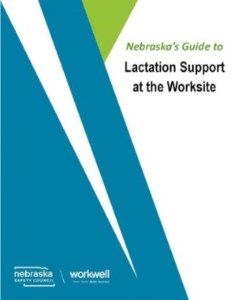Quick links:
What Experts Recommend Breastfeeding Worksite Laws
Worksite Policy Guide Community Resources/Community Breastfeeding Educators
Breastfeeding Benefits Employers
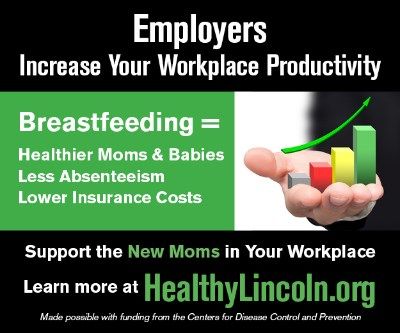
Employer Benefits
In 2010, 77.4% of moms were working moms ranking Nebraska as 5th in the nation for the number of moms returning to work. Mothers who breastfeed miss less work to care for sick infants than mothers who feed their infants formula. Mothers who breastfeed have a lower incidence of breast and ovarian cancer, cardiovascular diseases and type II diabetes. For employers that means higher productivity, lower health care costs, decreased absenteeism, higher loyalty, lower turnover rates, better job satisfaction, and enhanced overall company image and recruiting benefits.
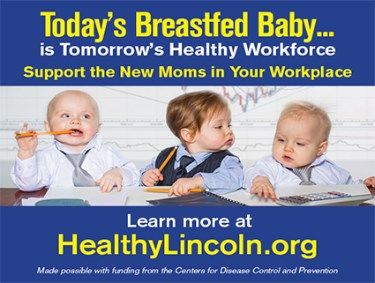
Facts - the Numbers
The business case for breastfeeding cost effectiveness:
- Breastfeeding friendly workplaces have been shown to decrease employee absenteeism by up to 57% due to the health benefits for both mother and baby, while enhancing employee productivity, loyalty, and morale.
- Companies save $3 for every dollar they spend supporting breastfeeding in the workplace.
- The U.S. Department of Agriculture estimates that a minimum of $3.6 billion in medical expenses annually would be saved if the number of children breastfed for six months were to increase by 50 percent.
Investing in a Healthier Future Workforce
Breastfeeding the recommended duration has lifelong health benefits for children, like lower rates of chronic obesity related diseases, a costly health insurance issue for employers. Supporting and accommodating nursing moms in the workplace, means investing in a healthier future workforce. That translates to lower health care costs and decreased absenteeism.
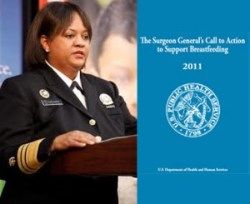
What Experts Recommend
In 2011, the US Surgeon General issued a national Call to Action to Support Breastfeeding. This report recommends widespread community efforts to create a supportive environment for new mothers in order to increase breastfeeding rates and improve the health of the nation. The American Academy of Pediatrics and the American Academy of Family Physicians were joined in February 2016 by the American College of Obstetricians and Gynecologists in recommending babies be exclusively breastfed for the first 6 months, with continued breastfeeding as complementary foods are introduced through the infant’s first year of life or longer as mutually desired by mother and infant.
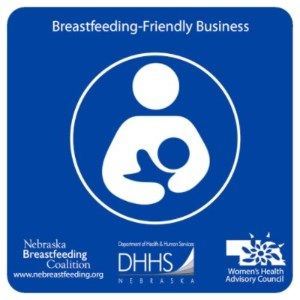
Challenges in the Workplace
Given the strong medical evidence about the benefits of breastfeeding to the long-term health of children and mothers, most moms say they intend to breastfeed. But while over 90% of Lincoln moms intend to breastfeed, under 11% continue to the 1 year recommended by the American Academy of Pediatrics. One of the roadblocks often cited by mothers is lack of support and accommodation in the workplace.
Creating a Breastfeeding Friendly Worksite Environment:
Know the Law
Nebraska Fair Employment Practice Act LB 627 (FEPA)
Effective August 30, 2015, Nebraska companies with 15 or more salaried or hourly employees must comply to making reasonable accommodations for break time and appropriate facilities for breastfeeding or expressing breast milk.
Under the Nebraska FEPA, breastfeeding moms are now a protected class similar to race and disability. Employers cannot discriminate on the basis of color, national origin, religion, sex, disability, marital status, and now an individual who’s pregnant, given birth or has a related medical condition (breastfeeding).
Discrimination includes not making “reasonable accommodations” for breastfeeding employees including time off to recover from childbirth or break time and appropriate facilities for breastfeeding or expressing milk.
Nebraska State Statute - Allow Breastfeeding as Prescribed LB 197
Nebraska was one of the last remaining states to pass a law in 2011 that gives women the legal right to breastfeed her child in any public or private location where the mother is otherwise authorized to be.
Fair Labor Standards Act (FLSA) 2010
The FLSA is a federal law applying to any company of 50 or more employees with regards to lactation support. Under this law, an employer shall provide:
- a reasonable break time for an employee to express breast milk for her nursing child for 1 year after the child’s birth each time such employee has need to express the milk
- a place, other than a bathroom, that is shielded from view and free from intrusion from co-workers and the public, which may be used by an employee to express breast milk. An employer shall not be required to compensate an employee for pumping breaks unless they are already providing compensated breaks.
In 2022, PUMP for Nursing Mothers Act (“PUMP Act”) was passed that makes several important changes to the Break Time for Nursing Mothers law, which has required since 2010 that employers nationwide provide reasonable break time and a private, non-bathroom space for lactating employees to pump milk during the workday. The 2022 PUMP Act was passed to close some of the loopholes in the original 2010 law. It expands the legal right to receive pumping breaks and private space to nearly 9 million more workers, including teachers, registered nurses, farmworkers, and many others.
Makes it possible for an employee to file a lawsuit against an employer that violates the law. Before the PUMP Act became law, employees who were harmed when their employer did not provide break time and space were not able to seek a monetary remedy in court.
Clarifies that pumping time counts as time worked when calculating minimum wage and overtime if an employee is not completely relieved from their work duties during the pumping break.
Under the Break Time for Nursing Mothers law, as updated by the PUMP Act, employers of ALL sizes are required to provide a reasonable amount of break time and a clean, private space for lactating workers to express milk for up to one year following the birth of the employee’s child. The pumping space cannot be a bathroom. These protections apply regardless of the employee’s gender. Download informational flyer about the Pump Act and Break Time for Nursing Mothers law.
Creating a Breastfeeding Support Policy
For step by step help in developing and implementing worksite breastfeeding support policies download Nebraska’s Guide to Lactation Support at the Worksite.
Providing Resources to
New Moms/Families
Providing an information packet to expectant parents on your breastfeeding worksite policies and accommodations lets your employees plan and adjust, helping them to be more productive when returning to work. Providing breastfeeding information and resources within your packet lets your employees know you support their decision, which helps to lift employee morale and increases company loyalty.
Creating a Baby-Friendly Workplace
The Nebraska Breastfeeding Coalition recognizes employers with baby friendly workplaces.
Criteria and how to apply
Community Resource Directory
MilkWorks - MilkWorks is a non-profit, community breastfeeding center with offices in Lincoln, and Omaha, Nebraska. Under the medical direction of Kathy Leeper, MD, IBCLC, the center provides a wide range of education, support and clinical services to help mothers breastfeed their babies. No mother is denied services based upon ability to pay. . MilkWorks also provides oversight, mentoring, training, and support for the Community Breastfeeding Educators (CBEs). Currently, 37 CBEs offer peer counseling in 27 languages. For more contact information: Download a CBE brochure.
LLCHD - WIC - Another of our community health partners, the Women, Infant, and Children program (WIC), part of the Lincoln Lancaster County Health Department, provides nutrition and health services, and breastfeeding information and support for families with low to moderate income. LLCHD - WIC also has peer counselors to support breastfeeding and postpartum women in English and Spanish.
LLCHD Family Connects Program Family Connects is a universal newborn home visiting program in Lincoln-Lancaster County that provides a home visit by a Registered Nurse following your hospital stay. All families with a newborn who live in Lancaster County are eligible for a Family Connects visit. Nurse visits occur 3 weeks after baby is born and provide education and guidance about topics relevant to all newborns and maternal needs, including breastfeeding and postpartum support. Home visitation services are provided in the home or at another location in the community.
Family Services – WIC - Family Services Women, Infants, and Children Nutrition Program provides free food, nutrition information, and breastfeeding support to help keep pregnant women, infants and children under five healthy and strong for families with low to moderate income. Family Services - WIC also has peer counselors to support women on their breastfeeding and postpartum journey.
Nebraska Breastfeeding Coalition - The Nebraska Breastfeeding Coalition (NBC) is a network of individual members and organizational partners dedicated to improving the health of Nebraskans by making breastfeeding the norm through education, advocacy and collaboration. The coalition works together to share information and partner in activities to increase breastfeeding rates across the state. Visitors to their web site can find the location of a lactation consultant nearest them.
Malone Community Center - The Malone Center serves Black, Indigenous and other families of color through a variety of services and outreach. Malone’s Melanin Mommas Support Group, Melanin Dads and Partners Support Group and Breastfeeding Peer Counseling programs include emotional support, lactation assistance, patient advocacy, education, virtual support, 1:1 support in the home and office, delivery of essential supplies, and group events to develop a strong support network for women and families. They also offer a variety of breastfeeding education courses, taught 1:1 or in group settings led by an International Board Certified Lactation Consultant.
Asian Community and Cultural Center - The Asian Center provides services and programs serving immigrant and refugee families in Lincoln. The center has onsite Community Breastfeeding Educators and provides breastfeeding education and information in several languages for mothers and families new to America from Asian, African, and Middle eastern countries at the center, within their community or homes of the families they serve.
El Centro de las Americas - El Centro provides services in the areas of education, family support, youth empowerment, health, and resource navigation for Lincoln’s Hispanic/Latino community. The center has an onsite Community Breastfeeding Educator and provides breastfeeding education and information in English and Spanish at the center and within the community or homes of the families they serve. Informacion de Amamantar en Espanol.
Lincoln Family Medicine Center - Lincoln Family Medicine provides a wide range of acute, chronic, and preventive medical care including (1) Prenatal care through Birth and Postpartum (2) Childhood through Adolescent , and (3) Adulthood to End-of-life Care. The center has an onsite Community Breastfeeding Educator and provides breastfeeding education and information in English and Spanish at the center.
